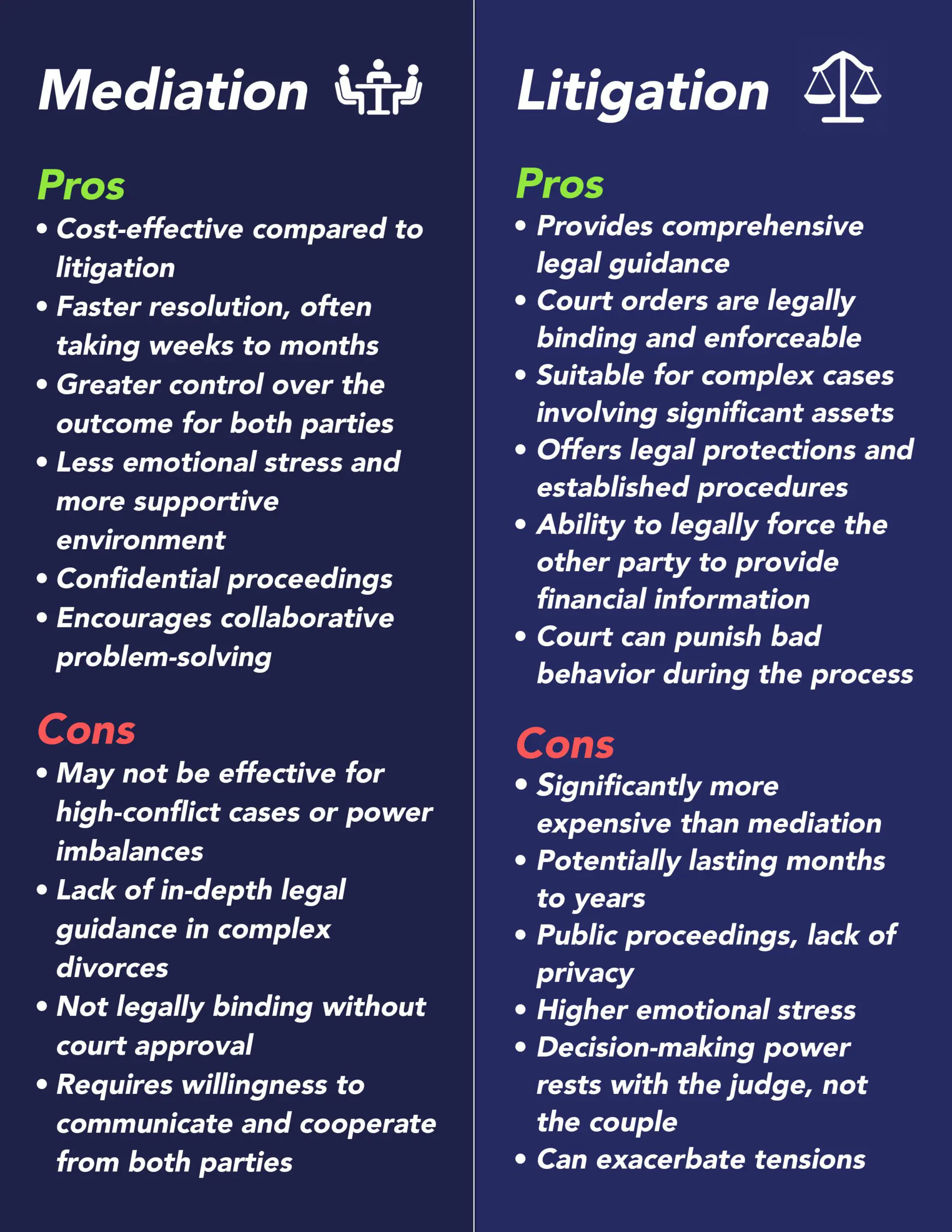When couples decide to divorce, the way they choose to do it can have significant implications for both of them, and to their family as a whole. Divorce mediation and litigation represent two divergent approaches to handling a divorce, each with its own procedures, costs, and emotional impact.
Mediation adds a neutral third party who helps the couple reach an agreement that is fair and mutually satisfactory without the need for a court trial, focusing on negotiation and compromise.
On the other hand, litigation is a more traditional route where each party presents their divorce case in court, and a judge makes the final decisions regarding the distribution of assets, child custody, and other pertinent issues.
Key Takeaways
- Divorce mediation offers a more private, controlled negotiation, whereas litigation involves court trials and judicial decisions.
- Mediation can be more cost-effective and quicker than litigation, potentially leading to less acrimonious post-divorce relationships.
- The choice of mediation or litigation can greatly affect the emotional well-being of the family and the complexity of the legal process.
Mediation vs Litigation, Pros and Cons
The choice between mediation and litigation can influence not only the duration and cost of the divorce process but also the future relationship dynamic between the ex-spouses, especially when children are involved.
Mediation is generally seen as a faster and more cost-effective method than litigation, providing a more private and controlled environment that can foster a cooperative rather than adversarial relationship post-divorce.
Litigation may be necessary in cases where there is a high net worth divorce, a significant imbalance of power, a history of abuse, or an inability to negotiate in good faith. Understanding the legal and financial complexities involved, as well as the long-term effects on family dynamics, is crucial for couples considering these alternatives.

Whats is Divorce Mediation?
Divorce mediation sessions are meetings where a neutral third party, the mediator, assists couples who are going through a divorce to reach an agreement outside the court system. It emphasizes confidentiality and open communication, aiming to find common ground for both parties.
Divorce mediation differ from litigation in that it involves a cooperative process with a neutral third party guiding the spouses towards a mutually acceptable result, while litigation refers to a court hearing where each side presents evidence to a judge for a ruling.
Role of a Mediator
The divorce mediator in divorce mediation serves as a facilitator for communication between the divorcing parties. They provide guidance but do not make decisions for the couple. Divorce mediators nurture an environment where both individuals can discuss their needs and interests openly. Their key role is to help both parties reach a compromise that is acceptable to all involved while ensuring the process remains respectful and equitable.
Benefits of Mediation
Mediation offers several advantages over traditional litigation:
- Confidentiality: Unlike court proceedings, which are public, mediation remains a private affair.
- Cost-Effectiveness: Mediation is typically less expensive than litigation due to lower legal fees and a quicker resolution.
- Control: Couples retain more control over the outcome as they work together to decide on the terms of their divorce.
- Communication: The process fosters better communication and can set a precedence for future interactions, especially important if children are involved.
Mediation can lead to more peaceful and efficient resolutions, including agreements on child support.
The Mediation Process

The process of mediation involves several steps to facilitate effective resolution:
- Initial Consultation: An introduction where the mediator explains the rules and goals of the process.
- Information Gathering: Parties share relevant information about assets, liabilities, and other factors.
- Issue Identification: Key issues such as child custody, support, and asset division are identified.
- Negotiation: The mediator assists the couple in exploring options and negotiating an agreement.
- Agreement Drafting: Once a compromise is reached, the mediator drafts a marital settlement agreement, which can then be made legally binding by a court.
Divorce mediation helps maintain privacy and fosters a cooperative rather than adversarial process, often resulting in less emotional stress. Mediators facilitate this process by ensuring both parties communicate effectively, helping them find a mutually satisfactory resolution.
Understanding Divorce Litigation
Divorce litigation is a legal process where each party, often aided by their respective divorce lawyer, presents their case before a judge in a court of law. This formal approach aims to resolve marital disputes and terminate the marriage through a trial, if necessary.
Role of Lawyers in Litigation
In divorce litigation, each party typically retains a family law attorney to represent their interests. These lawyers are responsible for preparing legal documents, gathering evidence, conducting discovery, and devising a strategy to present the client’s case in court. Their primary objective is to advocate on their client’s behalf, seeking favorable outcomes while navigating through complex court proceedings.
The Adversarial Nature of Litigation
Divorce litigation is inherently adversarial. It involves two parties with opposing interests working to convince the court of their arguments. This process is often contentious, as attorneys cross-examine witnesses, challenge evidence, and argue legal points to undermine the opposition’s case. The goal is to show their client’s position in the most persuasive light to achieve the desired legal outcome.
Litigation Procedure

The procedure for litigated divorce follows a structured path:
- Initial Pleadings: The process begins with filing a complaint or petition for divorce to initiate litigation.
- Discovery: Both parties exchange evidence and information relevant to the case.
- Motions: Either party may file requests for the court to rule on certain issues before trial.
- Trial: If no settlement is reached, the case goes to trial where both sides present their arguments.
- Judgment: The judge makes a final decision on all contested matters, including asset division, custody, and support, and issues the final divorce decree.
Throughout these steps, the presence of an experienced divorce attorney can be crucial. They ensure compliance with legal procedures and advocate vigorously for their client’s interests within the confines of the law.
Comparing Costs and Timeline
In divorce proceedings, the choice between mediation and litigation can have significant implications on both the costs incurred and the timeline to resolution.
Another alternative is collaborative divorce, which combines elements of both mediation and litigation, offering a balanced approach to resolving disputes.
Cost Analysis
Divorce mediation typically offers a more cost-effective path than litigation. Mediation involves a neutral third party who helps both parties reach a mutual agreement outside the courtroom. This process may require fewer billable hours from attorneys and avoids the costs associated with a full court trial.
Spousal support is one of the key matters decided in both mediation and litigation, with judges determining it in court and mediators helping couples reach a settlement on this crucial issue.
| Expense Category | Divorce Mediation | Divorce Litigation |
|---|---|---|
| Attorney Fees | Lower due to less time-intensive work | Higher due to preparation and court time |
| Court Costs | Minimal fees for filing paperwork | Higher court fees for multiple appearances |
| Miscellaneous Expenses | May include mediation fees | Can include expert witness and discovery costs |
Timeline Expectations
The timeline for a mediated divorce can be significantly shorter than that of litigated divorce. Mediation sessions can be scheduled and completed in a matter of weeks or months, depending on the complexity of the issues and the willingness of parties to cooperate. In contrast, litigation is subject to the court’s schedule, which can lead to extended delays.
| Phase | Divorce Mediation | Divorce Litigation |
|---|---|---|
| Initial Court Paperwork | Expedited as no immediate court date is needed | Can be quick, but subsequent scheduling is subject to court availability |
| Reaching an Agreement | Can occur in a few sessions over weeks/months | May take months to years, depending on case complexity and court backlog |
| Finalization | Once agreement is reached, legal formalities can be swift | Post-trial motions and appeals may extend the timeline even after a court decision |
Divorce mediation may present a faster solution with less financial strain, especially when both parties are open to compromise. Litigation, while potentially lengthier and costlier, may be necessary when parties cannot agree or in complex cases requiring judicial intervention.
Conclusion
At Duncan Family Law, we understand that every divorce is unique, requiring tailored approaches to achieve the best outcomes for our clients. With a profound commitment to excellence, expertise, and ethical practice, we offer comprehensive legal support, whether through mediation or litigation.
Our experienced team excels in guiding clients through divorce mediation, emphasizing confidentiality, cost-effectiveness, and fostering cooperative post-divorce relationships. When litigation is necessary, our skilled attorneys provide vigorous representation to protect your interests and ensure fair outcomes.
Choosing a reputable law firm will help you secure your emotional well-being, financial security, and family dynamics. We are dedicated to providing you with the highest level of legal service, combining expertise with a compassionate approach to navigate the complexities of divorce.
FAQs About Divorce Mediation vs Litigation
- What is the collaborative divorce process, and how does it differ from mediation and litigation?
The collaborative divorce process focuses on cooperation and mutual agreement between spouses, involving their own attorneys and other professionals. Unlike litigation, it avoids court trials, and unlike mediation, the attorneys actively participate in negotiations. - How does a neutral third party assist in divorce mediation?
A neutral third party, called a mediator, facilitates discussions between divorcing parties to help them reach a mutual understanding on disputed issues such as property division, custody, and support. - What legal procedures are required in mediation compared to litigation?
Mediation involves fewer formal legal procedures and focuses on resolving issues outside of court, whereas litigation follows structured legal processes, including filing a divorce complaint and attending court dates. - How is property division handled differently in mediation versus litigation?
In mediation, divorcing spouses work collaboratively to create customized solutions for property division. In litigation, a judge makes the final decision based on legal statutes. - What are the benefits of mediation services for divorce proceedings?
Mediation services are cost-effective, less time-consuming, and allow divorcing couples to maintain decision-making power. Litigation, on the other hand, often involves higher attorney fees and the final say rests with the court. - Can mediation help in high conflict situations, or is litigation a better option?
Mediation can be effective even in high conflict situations if both parties are committed to the process. However, if one spouse refuses to participate in good faith or issues like domestic violence are present, litigation may be necessary. - What is the role of a mediator compared to a judge in divorce cases?
A mediator facilitates communication to help divorcing parties reach a divorce agreement collaboratively. A judge, in litigation, imposes decisions on disputed issues based on legal arguments and evidence. - How does the cost of litigation compare to mediated divorces?
Mediated divorces are generally more cost-effective due to lower attorney fees and fewer court-related expenses. Litigation often involves higher costs due to prolonged court battles and formal legal procedures. - How do mediation sessions differ from court hearings in the litigation process?
Mediation sessions are private and confidential, allowing for open dialogue to reach a cooperative solution. Court hearings in litigation are formal, public records, and the decision-making power lies with the judge. - What happens if one party does not agree during mediation?
If one party cannot reach an agreement in mediation, the divorcing couple may proceed to litigation, where a judge will resolve the disputed issues. Mediation requires a mutual understanding and willingness to compromise for a successful mediation.






